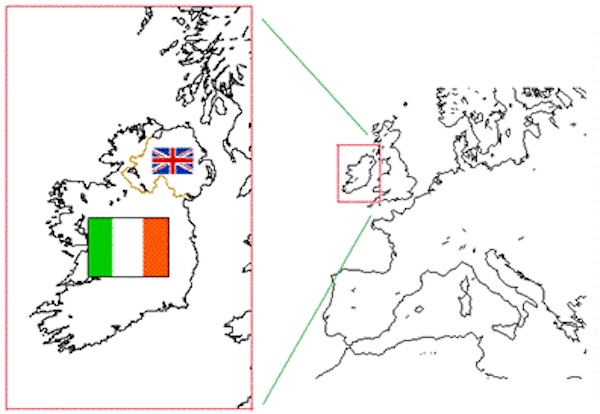
by Joe McVeigh
The claim of the DUP and the Tory London government that Northern Ireland is part of the United Kingdom is bogus. It is based on the pretence that part of Ireland still belongs to Britain and must therefore submit to the wishes of the majority in the United Kingdom. That north-eastern part of Ireland comprising of six of the 32 counties is, always was and always will be part of Ireland. It is not now and never will be British. Those who claim to be unionist may regard themselves as British but they live on Irish soil and are here as a result of colonisation. They have a right to live in Ireland but they have no right to prevent the Irish people from being part of one historical Irish nation.
The claim by the DUP and the British Tory government that N Ireland should not be granted special status by remaining in the EU Customs Union is unacceptable. This claim is based on the bogus argument that granting special status would undermine the integrity of the constitutional position of Northern Ireland as part of the United Kingdom. This bogus argument must be challenged by the Irish people and by the Dublin government.
The British claim to jurisdiction over a part of Ireland is tolerated under the terms of the Good Friday Agreement(1998) until such time as a border poll is held. Irish nationalists and republicans need to argue now more than ever for the integrity of the Irish Nation - a nation which has been denied full independence by the British government when it claimed jurisdiction in the whole island in 1800 and in the north-eastern 6 counties in 1920. The Unionist claim that the northeast 6 counties is part of the UK has no moral or legitimate basis. That claim is based on coercion.
The late Sean Mac Bride, Nobel Peace prize winner, wrote once about the right of the Irish people to Sovereignty and Independence (‘A Message to the Irish People’, Mercier Press, 1985): ‘The Irish People’s Fundamental Constitutional Rights in this century to Sovereignty, Independence and Unity are set forth in the Proclamation of Easter 1916, the Declaration of Independence of 21 January 1919, the Constitution of Ireland of 1 July 1937, the Republic of Ireland Act 1948 and the unanimous Declaration of Dail Eireann of 10 May 1949, transmitted to all the parliaments of the world.’
Faced with Brexit and the probability of a return to border controls, it is important that the Dublin government and our allies in the EU defend Ireland’s right to self-determination and Ireland’s right to independence and freedom from British rule. These rights are inviolable and must be respected internationally. During the Brexit negotiations Dublin and the EU have an opportunity to make the case for Irish re-unification and therefore special status for the 6 counties within the EU.
The citizens of the north cannot be bound by the results of a referendum organised by the British parliament and promoted by right wing elements in the Tory party and the DUP. Since the Belfast Agreement in 1998, the citizens of the northeast of Ireland must be treated as separate from the UK. The Dublin government must uphold the rights of Irish citizens in the north since they are co-guarantors of that Agreement. The democratic wishes of the majority in the northeast of Ireland who voted to Remain in the European Union must be upheld.
The only way now to respect that vote and to avoid a hard Brexit is by respecting the integrity of the Irish nation and the probability of Ireland becoming a united sovereign nation in the not too distant future when a border poll is held. It is now up to the Dublin government to prepare the people of Ireland for a border poll that is required under the terms of the Good Friday Agreement. This is the democratic way forward.
![[Irish Republican News]](https://republican-news.org/graphics/title_gifs/rn.gif)
![[Irish Republican News]](https://republican-news.org/graphics/title_gifs/harp.gif)

